Sample letter explaining criminal record – Have you ever needed to write a letter telling someone about your mistake? Writing a letter to say you did something wrong can be hard.
But don’t worry. It can be a good thing too. It shows that you are honest and want to make things right. This article will help you write a letter if you need to explain a criminal record. We’ll show you how to put the letter together and tell your story so people can understand.
You will learn about the introduction of the individual, how to address the recipient, how to explain the criminal record, how to close the letter, and some writing tips. Now, let’s get started on how to write this letter!
Components of the Letter
Introduction of the Individual
When you start the letter, you should make sure the person knows who you are. Include:
- Name: Write your full name so they know who you are.
- Contact Information: Include your phone number, email, and address if they need to reach you.
- Relationship to the recipient (if any): Explain how you know them or why you’re writing to them.
Addressing the Recipient
Using the person’s title and name is polite if you know it. Include:
- Title: If they have a special title like Dr., Mr., Mrs., use it.
- Organization’s Name: If you’re writing to a business, include its name.
- Address: Writing the address shows you’ve done your homework to find the correct place to send it.
Explanation of the Criminal Record
This part is very important. You must explain what happened, why, and how you’ve changed. Include:
- Charge: What was the exact crime or charge? Be specific.
- Circumstances: What were the things that led to this mistake? Try to explain without making excuses.
- Sentence: If there was a punishment, like jail time or fines, mention it.
- Rehabilitation Efforts: Talk about how you’ve tried to make things right, like taking classes, doing community service, etc.
- Supporting Documents (if any): If you have papers that show your efforts to change, you should mention them or include copies.
Closing the Letter
Wrap up your letter neatly by:
- Expressing Gratitude: Thank the person for taking the time to read your letter.
- Offering Additional Information: Let them know you’re happy to provide more details if needed.
- Including a Formal Sign-Off: Use words like “Sincerely” or “Respectfully” before your name and signature.
Postscript (Optional)
Sometimes, a postscript (P.S.) can add a personal touch or emphasize a point. Include:
- Final Thoughts: If there’s something else you want them to know.
- Additional Contact: If someone else can vouch for you, like a lawyer or mentor, you might include their contact info here.
The components of the letter are like the parts of a puzzle. Each one helps to tell your story. They should work together to show who you are, what happened, and how you’ve tried to make things right. If you take the time to do this well, the person reading your letter might be more understanding and willing to give you a chance.
Tips for Writing a Letter Explaining a Criminal Record
He is some tips for writing a letter explaining a criminal record.
Understand Your Purpose: Know why you are writing the letter. Is it for a job, a license, or something else? It helps you to focus on what’s important.
Be Honest but Discreet:
- Tell the Truth: Say what happened, but mention only a few details.
- Show You’ve Changed: Explain what you’ve done since to become a better person.
Use Simple Language:
- Grade Level: Write so everyone can understand.
- Avoid Jargon: Don’t use big words or legal terms without explaining them.
Stay Professional and Respectful:
- Formal Tone: Keep your writing polite and businesslike.
- Proofread: Make sure everything is correct in spelling and grammar.
Highlight Growth and Responsibility:
- Positive Changes: Talk about how you have grown and improved since the incident.
- Provide Evidence: Include certificates or references that prove your claims.
Consider the Recipient:
- Know Who You’re Writing To: Consider what the person reading your letter might be worried about and address those concerns.
- Maintain Respect: Even if you disagree, stay respectful in your tone.
Use Clear Formatting:
- Standard Structure: Use a normal letter format with an introduction, body, and conclusion.
- Bolded Words and List Tables: This can make your letter easier to read.
Seek Help if Needed:
- Consult a Professional: If you need more clarification, get help from a lawyer or professional writer.
By following these tips, you can write a letter that explains your criminal record in a way that is honest and respectful and shows how you have grown and changed. Whether writing to an employer, a friend, or someone else, these tips can help you say what you need to say in the best possible way.
Sample Letter Explaining Criminal Record
below are sample letter explaining criminal record:
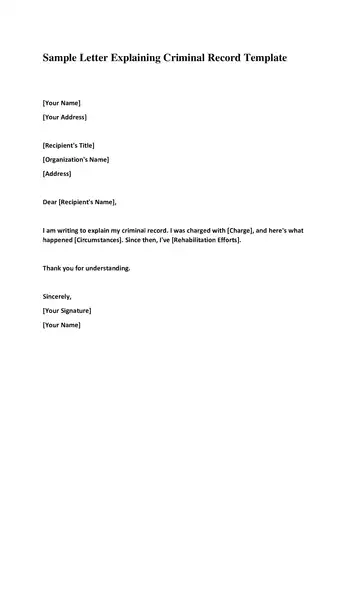
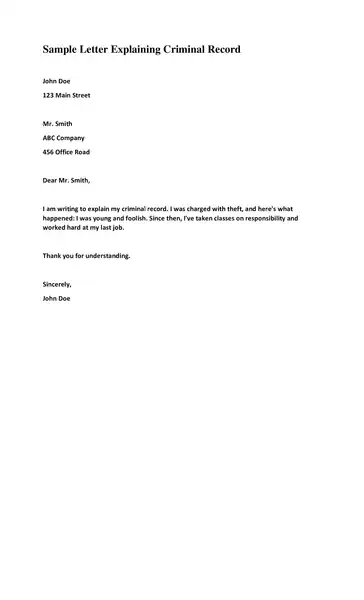
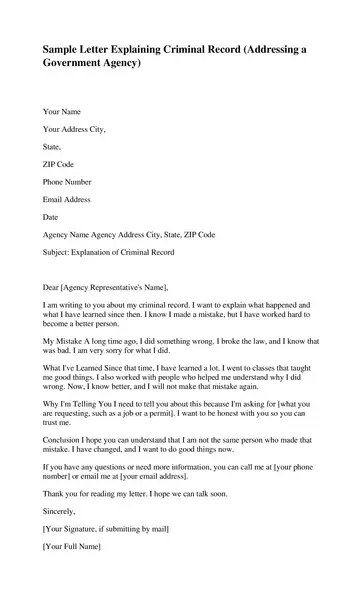
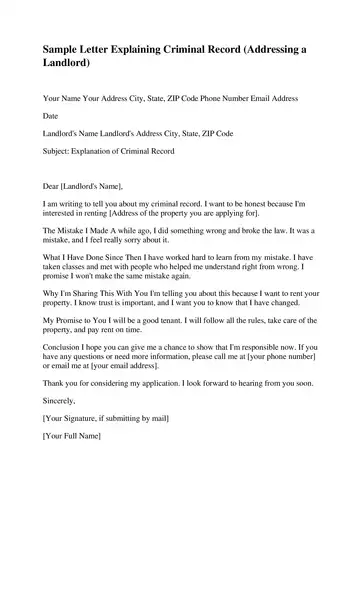
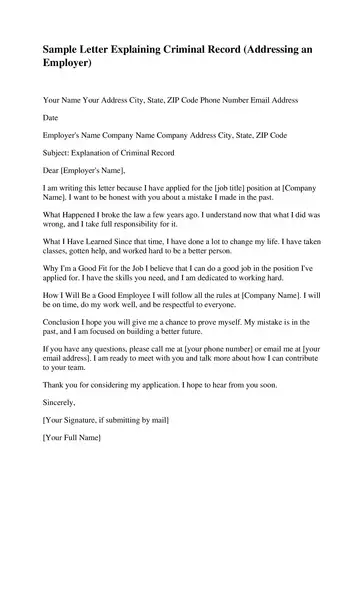
Extra Help
If you need more help writing a letter about a criminal record, these things might help:
Help with the Law
- Local Law Firms: Some lawyers might help you for free or less money.
- Legal Aid Groups: These people help if you have little money.
- Online Law Websites: Websites like LegalZoom can help you find a lawyer.
Help with Writing
- Libraries: Libraries have books that show you how to write letters.
- Online Writing Websites: Websites like Purdue OWL have writing tips.
- Professional Writers: Some people write letters for you.
Help from Friends and Groups
- Rehab Centers: Places that help people feel better after they get in trouble.
- Friend Groups: Groups in your town can help you feel better.
Help from the Government
- Legal Departments: Places that tell you the rules about telling people about criminal records.
- Job Places: Places that help you find a job and tell you how to talk about your criminal record.
Learn More
- Books on Legal Writing: Books that teach you how to write about the law.
- Online Classes: Websites like Coursera have classes to learn writing.
Feel Better
- Therapists and Helpers: People who can help you feel better if you’re sad or scared.
These helpers can give you what you need to write a good letter. They can help you with the law, writing, friends, rules, learning, and feeling better. You can find what works best for you.
Good Things About Writing a Letter to Say You Did Something Wrong
Writing a letter to tell people you did something wrong can be good. Here’s why:
You Can Tell the Truth
If you tell people what you did wrong, they will trust you. It shows you are sorry.
You Can Tell Your Story
You can say why you did something wrong. It helps people understand you better.
You Show You Are Better Now
You can say what you did to be better. It shows you want to do good things now.
You Might Get What You Want
If you want a job, a house, or something else, the letter can help you get it.
You Do What You Have to Do
If someone needs the letter, like a boss or a judge, you must give it to them. This is good.
You Can Think About What Happened
Writing the letter helps you think about what you did. It helps you say sorry and move on.
You Look Good
A good letter shows you are a good person now. It helps people like you more.
Writing a letter to say you did something wrong helps in many ways. It helps people understand you. It shows you are sorry and want to be better. It can help you get what you want. It’s a good thing to do.
The Common Mistakes How to Avoid
Mistakes in such a letter can lead to misunderstandings or negative impressions. Below are common mistakes and strategies to avoid them:
Being Overly Vague or Ambiguous
Mistake: Lack of specificity.
How to Avoid: Be clear and concise about the events, taking responsibility where necessary, without being overly complex.
Overly Emotional Language
Mistake: Using an overly sentimental or emotional tone.
How to Avoid: Maintain a balanced, sincere tone that conveys genuine feelings without appearing unprofessional.
Lack of Proofreading
Mistake: Leaving spelling and grammatical errors.
How to Avoid: Carefully proofread the letter or seek professional help to ensure accuracy and professionalism.
Failing to Include Supporting Evidence
Mistake: Omitting documents or references that support your claims.
How to Avoid: Include relevant evidence or references that back up statements made in the letter.
Not Following a Formal Structure
Mistake: Disorganized or disjointed writing.
How to Avoid: Follow a clear structure with an introduction, body, and conclusion, maintaining a logical flow.
Overemphasis on the Negative
Mistake: Focusing too much on the negative aspects.
How to Avoid: Balance the negative aspects with positive changes, growth, and what has been learned from the experience.
Ignoring the Reader’s Perspective
Mistake: Please consider the recipient’s concerns or questions.
How to Avoid: Write with the reader’s perspective, proactively addressing potential concerns and questions.
Omitting a Call to Action or Conclusion
Mistake: Leaving out a clear conclusion or call to action.
How to Avoid: Summarize the main points or guide the reader on the next steps at the end of the letter.
The strategies provided here serve as a roadmap to help ensure the letter fulfills its purpose and resonates with the reader.
Conclusion
Writing a letter to explain a criminal record is not easy. It’s something very personal and can be hard to say. But with the help of this article, you can write a letter that is honest, clear, and shows how you have grown.
Remember these key things: Tell the truth by saying what happened in a simple and true way. Be respectful by writing politely. Show you’ve changed by talking about the good things you’ve done since.
Use clear formatting to make the sample letter explaining criminal records easily read with bolded words. Following these tips, you can write a letter that helps people understand you. It could help you get something you want, like a job or a house. The important thing is to show that you are sorry and want to be a better person now. You can do it, and this guide is here to help you.
FAQs
What should I put in the letter about something wrong I did?
Put in the letter what you did wrong, why you did it, what you learned, and how you are better now. Be honest and nice.
Can I write the letter myself, or do I need a lawyer?
You can write a letter. A lawyer can help if you want to make sure it’s just right.
How long should the letter be?
Make the letter short but tell everything you need to. One or two pages.
Who should I write the letter to?
Write a letter to the person who wants it, like a boss or a judge. If you don’t know, you can say, “To Whom It May Concern.”
What if I don’t tell you about my wrong thing in the letter?
You could get in big trouble if you don’t tell the truth. Always tell the truth.
How do I make sure my letter is liked?
Write with love and be real. Show how you are better now. You can ask a helper to make sure it’s good.
Can I put in other papers with the letter?
Yes, you can put in papers that show you are better, like awards.
Will the letter make everything okay?
A good letter helps, but it can only make some things okay. Other things matter too.
Where can I find a letter like mine?
You can find letters like yours online, at the library, or ask a lawyer.
How do I talk about really hard things in the letter?
If something is hard to say, you can ask a helper like a lawyer or a writer to help you say it right.
It is how you can write a letter if you do something wrong. It tells how to make the letter good.

The content creator team at calipsotree.com is dedicated to making topics accessible to everyone, with over 9 years of experience in writing and breaking down complex concepts into easy-to-understand articles that answer readers’ financial questions.








